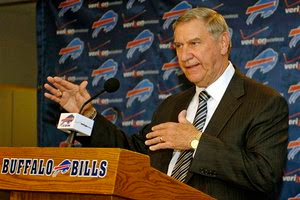 Given that a rookie wage scale may not be in place for 2011, Jason La Canfora of the NFL Network has a theory that teams at the top of the NFL draft may let a few picks go by before turning in their draft cards in an attempt to save money on rookie contracts.
Given that a rookie wage scale may not be in place for 2011, Jason La Canfora of the NFL Network has a theory that teams at the top of the NFL draft may let a few picks go by before turning in their draft cards in an attempt to save money on rookie contracts."I'm talking about making a conscious, strategic, organizational decision to skip a particular selection if the draft board goes a certain way. Then, pop back up a few selections later only to land the same original target, or if not, then certainly a similar player of need," writes La Canfora. "It's a bit risky, sure. But I think in most cases the gamble is not as great as it sounds. It would certainly be brassy, controversial, and take a certain chutzpah to execute. But it could end up making tremendous fiscal sense without really compromising the ability to land a quality prospect."
La Canfora floated the idea to player agents and several general managers, the latter of which would not be surprised if a team did that this year.

The team cited as an example is the Cincinnati Bengals, a small-market team who have the fourth overall pick. If they're leaning towards one of the top receivers, either Georgia's A.J. Green or Alabama's Julio Jones, they may let the pick pass until they think the next team on the clock is going to pick the player they most covet, saving millions of dollars in the process.
Of course, the player's agent and trade association will argue that no matter what three-card monte approach a team took to make their pick, the player deserves to be paid in line with the team's original draft slot.
Another potential issue to consider in this scenario is the rookie pool.
The absence of a rookie wage scale would mean there is no collective bargaining agreement. If that's the case, and the lockout is lifted, the expectation is that 2011 would be played in an economic environment similar to 2010.
Despite being an uncapped season, there was still a "Rookie Pool", which limits the amount of first-year compensation teams can pay their draft picks, that teams needed to comply with. Each team's rookie pool is based on their number of draft choices and the slot in each round those picks were made.
If a team, like the Bengals, were to let the fourth pick pass, and turned their card in before the Tennessee Titans made the eighth pick, they may still receive a rookie pool allotment equal to the fourth overall pick. The teams picking after them--the Arizona Cardinals, Cleveland Browns, and San Francisco 49ers--may applaud the "courageous" approach by Mike Brown, but they certainly wouldn't be on board with having to negotiate off a contract one slot higher than they actually picked.
According to my tracking of rookie signing data, only 12 of the last 50 players chosen in the Top 10 have been signed in time for the start of training camp. Getting players chosen in that part of the draft into camp on time has been enough of a chore for NFL front offices, and the last thing the process needs are tightwad owners getting cute to avoid paying a "Loser's Tax" (guaranteed money paid to Top 10 picks) that could have been avoided in a more respectable manner had they simply won more games last year, i.e. drafted more smartly, in previous drafts.
source: Mac's Football Blog
Posted by Brian McIntyre



No comments:
Post a Comment